The economic calculation problem (ECP) is a criticism of using central economic planning as a substitute for market-based allocation of the factors of production. It was first proposed by Ludwig von Mises in his 1920 article "Economic Calculation in the Socialist Commonwealth" and later expanded upon by Friedrich Hayek.
In economics, a free market is an economic system in which the prices of goods and services are determined by supply and demand expressed by sellers and buyers. Such markets, as modeled, operate without the intervention of government or any other external authority. Proponents of the free market as a normative ideal contrast it with a regulated market, in which a government intervenes in supply and demand by means of various methods such as taxes or regulations. In an idealized free market economy, prices for goods and services are set solely by the bids and offers of the participants.

A market economy is an economic system in which the decisions regarding investment, production, and distribution to the consumers are guided by the price signals created by the forces of supply and demand. The major characteristic of a market economy is the existence of factor markets that play a dominant role in the allocation of capital and the factors of production.

In economics, an externality or external cost is an indirect cost or benefit to an uninvolved third party that arises as an effect of another party's activity. Externalities can be considered as unpriced components that are involved in either consumer or producer market transactions. Air pollution from motor vehicles is one example. The cost of air pollution to society is not paid by either the producers or users of motorized transport to the rest of society. Water pollution from mills and factories is another example. All (water) consumers are made worse off by pollution but are not compensated by the market for this damage. A positive externality is when an individual's consumption in a market increases the well-being of others, but the individual does not charge the third party for the benefit. The third party is essentially getting a free product. An example of this might be the apartment above a bakery receiving some free heat in winter. The people who live in the apartment do not compensate the bakery for this benefit.

Joseph Eugene Stiglitz is an American New Keynesian economist, a public policy analyst, political activist, and a professor at Columbia University. He is a recipient of the Nobel Memorial Prize in Economic Sciences (2001) and the John Bates Clark Medal (1979). He is a former senior vice president and chief economist of the World Bank. He is also a former member and chairman of the US Council of Economic Advisers. He is known for his support for the Georgist public finance theory and for his critical view of the management of globalization, of laissez-faire economists, and of international institutions such as the International Monetary Fund and the World Bank.

Globalization and Its Discontents is a book published in 2002 by the 2001 Nobel laureate Joseph E. Stiglitz. The title is a reference to Freud's Civilization and Its Discontents.

Criticism of socialism is any critique of socialist economics and socialist models of organization and their feasibility, as well as the political and social implications of adopting such a system. Some critiques are not necessarily directed toward socialism as a system but rather toward the socialist movement, parties, or existing states. Some critics consider socialism to be a purely theoretical concept that should be criticized on theoretical grounds, such as in the economic calculation problem and the socialist calculation debate, while others hold that certain historical examples exist and that they can be criticized on practical grounds. Because there are many types of socialism, most critiques are focused on a specific type of socialism, that of the command economy and the experience of Soviet-type economies that may not apply to all forms of socialism as different models of socialism conflict with each other over questions of property ownership, economic coordination and how socialism is to be achieved. Critics of specific models of socialism might be advocates of a different type of socialism.
The Anglo-Saxon model is a regulated market-based economic model that emerged in the 1970s based on the Chicago school of economics, spearheaded in the 1980s in the United States by the economics of then President Ronald Reagan, and reinforced in the United Kingdom by then Prime Minister Margaret Thatcher. However, its origins are said to date to the 18th century in the United Kingdom and the ideas of the classical economist Adam Smith.
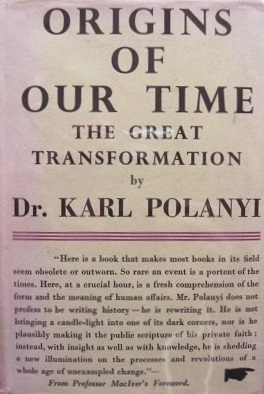
The Great Transformation is a book by Karl Polanyi, a Hungarian political economist. First published in 1944 by Farrar & Rinehart, it deals with the social and political upheavals that took place in England during the rise of the market economy. Polanyi contends that the modern market economy and the modern nation-state should be understood not as discrete elements but as a single human invention, which he calls the "Market Society".
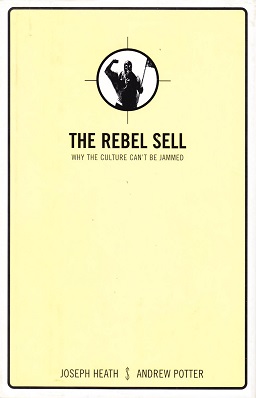
The Rebel Sell: Why the Culture Can't be Jammed is a non-fiction book written by Canadian authors Joseph Heath and Andrew Potter in 2004. The thesis of the book is that counter-cultural movements have failed to effect any progressive political or economic consequences; thus counter-culture is not a threat to "the establishment".
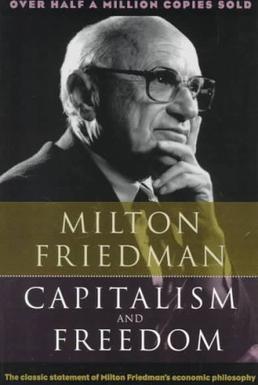
Capitalism and Freedom is a book by Milton Friedman originally published in 1962 by the University of Chicago Press which discusses the role of economic capitalism in liberal society. It has sold more than half a million copies since 1962 and has been translated into eighteen languages.
Joseph Heath is a Canadian philosopher. He is professor of philosophy at the University of Toronto, where he was formerly the director of the Centre for Ethics. He also teaches at the School of Public Policy and Governance. Heath's webpage at the University of Toronto declares his work "is all related, in one way or another, to critical social theory in the tradition of the Frankfurt School." He has published both academic and popular writings, including the bestselling The Rebel Sell, which he coauthored with Andrew Potter. His philosophical work includes papers and books in political philosophy, business ethics, rational choice theory, action theory, and critical theory. His stepmother is June Clark.
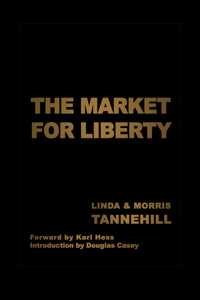
The Market for Liberty is a significant anarcho-capitalist book written by Linda and Morris Tannehill. It was preceded by the self-published Liberty via the Market in 1969. The work challenges statutory law and advocates natural law as the basis for society. It also argues that society would not be lawless in the absence of the state. The Market for Liberty spends a great deal of time outlining how different businesses and organizational structures would interact in a laissez-faire society and how these interactions would create checks which would ultimately keep the tendency for crime low. In keeping with radical free-market principles, the book is skeptical about the potential for violent anarcho-capitalist revolution to bring about good outcomes.

Filthy Lucre: Economics for People Who Hate Capitalism is a 2009 book by Canadian philosopher Joseph Heath.
Throughout modern history, a variety of perspectives on capitalism have evolved based on different schools of thought.
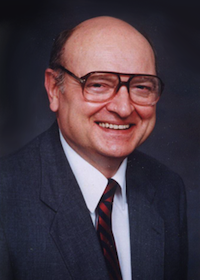
Ronald H. Nash was a philosophy professor at Reformed Theological Seminary. Nash served as a professor for over 40 years, teaching and writing in the areas of worldview, apologetics, ethics, theology, and history. He is known for his advocacy of Austrian economics, and his criticism of the evangelical left.

The socialist calculation debate, sometimes known as the economic calculation debate, was a discourse on the subject of how a socialist economy would perform economic calculation given the absence of the law of value, money, financial prices for capital goods and private ownership of the means of production. More specifically, the debate was centered on the application of economic planning for the allocation of the means of production as a substitute for capital markets and whether or not such an arrangement would be superior to capitalism in terms of efficiency and productivity.

Maurizio Lazzarato is an Italian sociologist and philosopher, residing in Paris, France. In the 1970s, he was an activist in the workers' movement in Italy. Lazzarato was a founding member of the editorial board of the journal Multitudes. He is a researcher at Matisse/CNRS, Pantheon-Sorbonne University, and a member of the International College of Philosophy in Paris.
The double movement is a concept originating with Karl Polanyi in his book The Great Transformation. The phrase refers to the dialectical process of marketization and push for social protection against that marketization. First, laissez-faire reformers seek to "disembed" the economy to establish what Polanyi calls a "market society" wherein all things are commodified, including what Polanyi terms "fictitious commodities": land, labor, and money. Second, a reactionary "countermovement" arises whereby society attempts to re-embed the economy through the creation of social protections such as labor laws and tariffs. In Polanyi's view, these liberal reformers seek to subordinate society to the market economy, which is taken by these reformers to be self-regulating. To Polanyi, this is a utopian project, as economies are always embedded in societies.
Progressive capitalism is an economic framework that seeks to recalibrate the roles of the market, state, and civil society to enhance societal well-being. This approach advocates for a new social contract that leverages market forces and entrepreneurship while addressing issues such as market dominance, inequality, and the consequences of globalization. Progressive capitalism emphasizes the need for government investment in technology, education, healthcare, and green infrastructure, alongside implementing public options for essential services.













